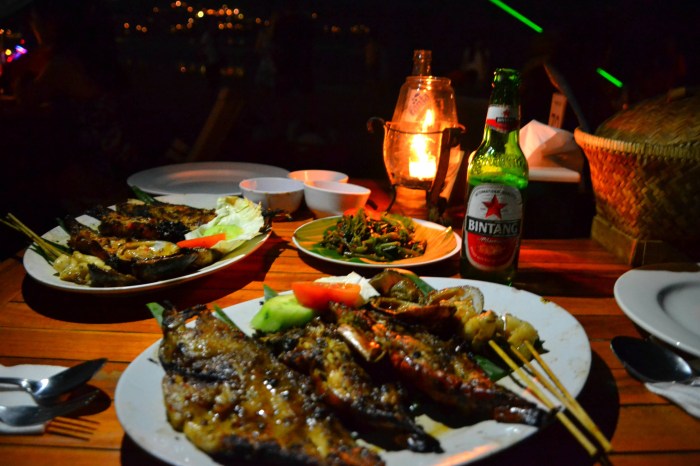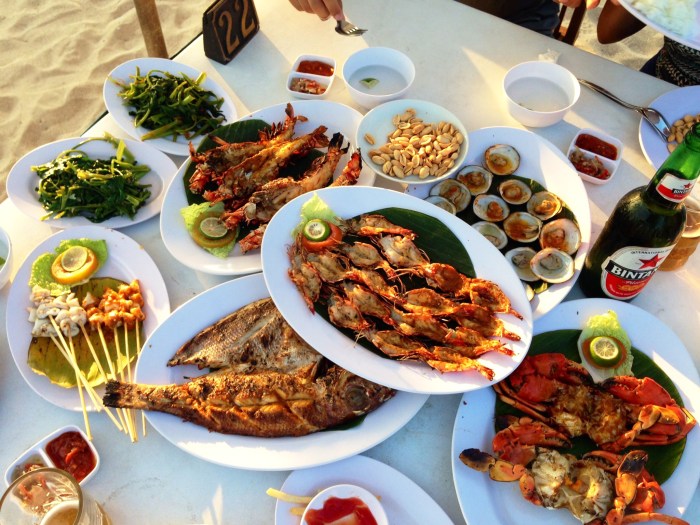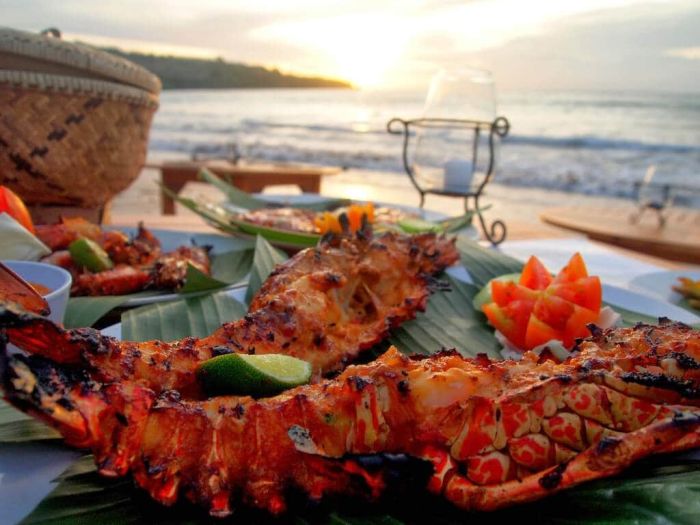Jimbaran seafood restaurants, nestled along the picturesque shores of Bali, offer a tantalizing culinary experience that blends traditional flavors with the freshest seafood. From the sizzling aromas of grilled fish to the vibrant flavors of local spices, Jimbaran seafood invites diners to embark on a journey of taste and cultural immersion.
The unique ambiance of these restaurants, with their open-air seating and the gentle sound of waves crashing nearby, creates a relaxed and convivial atmosphere. Whether it’s a romantic dinner or a casual gathering, Jimbaran seafood restaurants provide an unforgettable dining experience.
Jimbaran Seafood Restaurants

Jimbaran seafood restaurants offer a unique and unforgettable dining experience, with a casual and relaxed ambiance. Nestled along the beautiful Jimbaran Bay, these restaurants are renowned for their fresh seafood, grilled to perfection and served in a traditional Indonesian setting.
The atmosphere is lively and welcoming, with the sound of waves crashing in the background and the smell of grilled seafood filling the air.
Popular Jimbaran Seafood Restaurants
There are several popular Jimbaran seafood restaurants, each with its own specialties and ambiance. Some of the most famous include:
- Jimbaran Bay Seafood Restaurant:Known for its extensive menu of fresh seafood, including grilled fish, lobster, and prawns.
- Nelayan Restaurant:Specializes in traditional Indonesian seafood dishes, such as grilled snapper and spicy squid.
- The Warung Jimbaran:Offers a more casual dining experience, with grilled seafood served on bamboo skewers.
These restaurants provide a memorable and authentic Indonesian dining experience, with delicious seafood, a relaxed atmosphere, and stunning ocean views.
Jimbaran seafood is a must-try for seafood lovers, offering fresh and delicious dishes right on the beach. For those looking to explore beyond the culinary delights, there are numerous attractions near me to discover. After indulging in Jimbaran seafood, take a leisurely stroll along the beach or visit the nearby temples and cultural landmarks to immerse yourself in the local culture and history.
Types of Seafood Available

Jimbaran seafood restaurants offer a wide variety of fresh and delicious seafood. The most common types of seafood include:
- Fish:Jimbaran restaurants offer a wide variety of fish, including snapper, grouper, tuna, and mackerel. These fish are typically grilled or fried and served with a variety of sauces.
- Shellfish:Shellfish is another popular type of seafood in Jimbaran. Common shellfish dishes include shrimp, lobster, crab, and mussels. These dishes are typically steamed, grilled, or fried and served with a variety of sauces.
- Squid:Squid is a type of cephalopod that is often used in Jimbaran seafood dishes. Squid is typically grilled or fried and served with a variety of sauces.
- Octopus:Octopus is another type of cephalopod that is often used in Jimbaran seafood dishes. Octopus is typically grilled or fried and served with a variety of sauces.
The seafood used in Jimbaran restaurants is typically very fresh and of high quality. The fish is caught daily by local fishermen and the shellfish is harvested from the nearby waters. The seafood is then cooked to perfection by experienced chefs.
Jimbaran Seafood Cooking Techniques
Jimbaran seafood restaurants are renowned for their unique and flavorful cooking techniques that have been passed down through generations. These techniques involve the use of fresh, locally sourced seafood, combined with a blend of aromatic spices and herbs that create a symphony of flavors.
Traditional Cooking Methods
One of the most traditional cooking methods used in Jimbaran seafood restaurants is grilling. Fresh seafood, such as fish, prawns, and squid, is marinated in a mixture of spices, herbs, and coconut milk, then grilled over hot coals. This method imparts a smoky and slightly charred flavor to the seafood, while preserving its natural juices.Another popular cooking method is steaming.
Seafood is placed in a steamer basket lined with banana leaves, then steamed over a pot of boiling water. This gentle cooking method preserves the delicate flavors and textures of the seafood, resulting in a succulent and tender dish.
Local Spices and Herbs
Jimbaran seafood restaurants use a wide variety of local spices and herbs to enhance the flavors of their dishes. These include:
- Kunyit (turmeric): A vibrant yellow spice that adds a warm, earthy flavor and a bright color to dishes.
- Ketumbar (coriander): A fragrant spice that provides a citrusy and slightly nutty flavor.
- Jahe (ginger): A pungent spice that adds a spicy and aromatic note to dishes.
- Cabai (chili peppers): Used in varying degrees of spiciness, chili peppers add a fiery kick to dishes.
- Daun jeruk (lime leaves): These aromatic leaves impart a refreshing and zesty flavor to dishes.
Signature Dishes
Some of the signature dishes found in Jimbaran seafood restaurants include:
- Grilled Jimbaran Prawns: Fresh prawns marinated in a blend of spices and coconut milk, then grilled over hot coals.
- Steamed Snapper: A whole snapper steamed in banana leaves, served with a spicy dipping sauce.
- Cumi Bakar (Grilled Squid): Squid marinated in a spicy sauce, then grilled over hot coals.
These dishes showcase the traditional cooking techniques and flavors of Jimbaran seafood restaurants, offering a culinary experience that is both authentic and unforgettable.
Accompaniments and Side Dishes

Jimbaran seafood is often accompanied by a variety of side dishes and accompaniments that enhance its flavors and textures. These side dishes are an integral part of the Jimbaran seafood experience and hold cultural significance within the local cuisine.
Sambals
Sambals are a staple accompaniment to Jimbaran seafood, adding a spicy and flavorful kick to the dishes. These chili-based sauces are made with a variety of ingredients, including tomatoes, onions, garlic, and shrimp paste. The heat level of sambals can vary from mild to extremely spicy, catering to different taste preferences.
Grilled Vegetables
Grilled vegetables, such as corn on the cob, green beans, and eggplant, are a refreshing and healthy addition to Jimbaran seafood. These vegetables are grilled over an open flame, infusing them with a smoky flavor and tender texture.
Steamed Rice
Steamed rice is a classic side dish that complements the rich flavors of Jimbaran seafood. The plain and fluffy texture of rice helps balance the spiciness of the sambals and the bold flavors of the seafood.
Seafood Satay
Seafood satay is a popular accompaniment to Jimbaran seafood, consisting of grilled skewers of seafood, such as shrimp, squid, and fish. The seafood is marinated in a flavorful sauce and grilled to perfection, creating a tender and juicy dish.
Cultural Significance
The accompaniments and side dishes served with Jimbaran seafood hold cultural significance within the local cuisine. Sambals, for example, represent the spicy and flavorful nature of Indonesian cooking, while grilled vegetables reflect the importance of fresh produce in the local diet.
Steamed rice is a staple food in many Indonesian households and is considered a symbol of prosperity and abundance.
Health Benefits of Jimbaran Seafood
Jimbaran seafood is not only delicious but also highly nutritious. It is a rich source of protein, omega-3 fatty acids, vitamins, and minerals. Consuming Jimbaran seafood dishes offers various health benefits, including:
Heart Health
- Jimbaran seafood is high in omega-3 fatty acids, which have been shown to reduce the risk of heart disease. These fatty acids help lower blood pressure, improve cholesterol levels, and reduce inflammation.
- Seafood is also a good source of potassium, which helps regulate blood pressure.
Brain Health
- Omega-3 fatty acids are also essential for brain health. They help improve cognitive function, memory, and mood.
- Seafood is also a good source of choline, a nutrient that is important for brain development and function.
Bone Health
- Seafood is a good source of calcium and vitamin D, which are essential for bone health.
- Vitamin D helps the body absorb calcium, which is necessary for building and maintaining strong bones.
Specific Health Benefits of Certain Dishes
In addition to the general health benefits of Jimbaran seafood, certain dishes offer specific health benefits:
- Grilled fishis a good source of lean protein and omega-3 fatty acids.
- Steamed fishis a low-calorie and low-fat option that is high in protein and nutrients.
- Seafood soupis a good source of nutrients and can help boost the immune system.
Cultural Significance of Jimbaran Seafood
Jimbaran seafood holds deep cultural significance in Balinese cuisine, reflecting the island’s rich culinary heritage and close connection to the ocean. Seafood plays an integral role in traditional ceremonies, festivals, and daily life, symbolizing abundance, prosperity, and spiritual well-being.
Seafood in Traditional Ceremonies, Jimbaran seafood
In Balinese ceremonies, seafood is often used as an offering to the gods and ancestors. During the Nyepi ceremony, which marks the Balinese New Year, fish is cooked and offered as a symbol of purification and renewal. Similarly, in the Melasti ceremony, seafood is used to purify the sacred objects used in temple rituals.
Seafood in Festivals
Seafood is a staple ingredient in many Balinese festivals. During the annual Galungan festival, which celebrates the victory of good over evil, seafood dishes are prepared as a feast for the gods and ancestors. At the Kuningan festival, which marks the end of Galungan, seafood is again used in offerings and communal meals.
Cultural Beliefs and Practices
Beyond ceremonies and festivals, seafood holds cultural significance in Balinese beliefs and practices. Fish is considered a symbol of fertility and abundance, and it is often consumed by pregnant women to ensure a healthy pregnancy and birth. Additionally, seafood is believed to have healing properties and is used in traditional medicine to treat various ailments.
Sustainability and Environmental Impact
Jimbaran seafood restaurants are increasingly embracing sustainability practices to minimize their environmental impact. Responsible seafood sourcing has become a priority, with many restaurants partnering with local fishermen who employ sustainable fishing methods.
Indulge in the delectable flavors of Jimbaran seafood, renowned for its fresh catches and tantalizing spices. If you’re seeking a comfortable stay during your culinary adventure, consider the Burza Hotel Jogja. This elegant hotel offers cozy accommodations and a convenient location, allowing you to fully immerse yourself in the culinary delights of Jimbaran seafood.
Responsible Seafood Sourcing
Sustainable fishing practices aim to maintain healthy fish populations and marine ecosystems. Restaurants prioritize sourcing seafood from fisheries certified by organizations like the Marine Stewardship Council (MSC) or the Aquaculture Stewardship Council (ASC), ensuring that the fish is caught or farmed using responsible methods.
Examples of Sustainable Restaurants
- Jimbaran Bay Seafood Restaurant:Known for its commitment to sustainable seafood, using MSC-certified fish and supporting local fishermen who practice responsible fishing techniques.
- The Rock Bar Jimbaran:This iconic restaurant implements sustainable practices throughout its operations, including sourcing seafood from sustainable suppliers and reducing plastic waste.
Tourism and Economic Impact
Jimbaran seafood restaurants have played a pivotal role in attracting tourists to the region. The unique dining experience, combined with the stunning beach setting, has made Jimbaran a popular destination for both domestic and international travelers. The influx of tourists has had a positive impact on the local economy, creating jobs and boosting revenue for businesses in the area.
Economic Benefits
The Jimbaran seafood industry generates substantial economic benefits for the region. These restaurants employ a significant number of local people, providing them with stable incomes and opportunities for career growth. Additionally, the purchase of seafood and other supplies from local suppliers supports the local fishing industry and related businesses.
Role in Supporting Local Communities
Jimbaran seafood restaurants also play an important role in supporting local communities. Many of these restaurants are family-owned and operated, contributing to the preservation of traditional culinary practices and cultural heritage. The revenue generated by these restaurants is often reinvested in the community, supporting local schools, health clinics, and other essential services.
Jimbaran Seafood Recipes

Recreate the authentic flavors of Jimbaran seafood in the comfort of your own home with these easy-to-follow recipes. From grilled fish to succulent prawns, we’ve got you covered with step-by-step instructions and tips for achieving that perfect Jimbaran taste.
Jimbaran seafood is a must-try for seafood lovers. The grilled fish and seafood platters are simply delicious. After a satisfying meal, why not head over to universal studios singapore for some thrilling rides and entertainment? Once you’ve had your fill of excitement, come back to Jimbaran and enjoy more of its delectable seafood offerings.
Grilled Jimbaran Snapper
Ingredients:
- 1 whole snapper, cleaned and scaled
- 2 tablespoons olive oil
- 1 teaspoon salt
- 1/2 teaspoon black pepper
- 1/4 cup chopped cilantro
- 1/4 cup chopped onion
- 1/4 cup chopped tomato
Instructions:
- Preheat your grill to medium-high heat.
- Brush the snapper with olive oil and season with salt and pepper.
- Place the snapper on the grill and cook for 5-7 minutes per side, or until cooked through.
- Remove the snapper from the grill and let it rest for a few minutes before serving.
- Top the snapper with cilantro, onion, and tomato.
Jimbaran-Style Prawns
Ingredients:
- 1 pound prawns, peeled and deveined
- 2 tablespoons olive oil
- 1 teaspoon garlic powder
- 1 teaspoon onion powder
- 1 teaspoon paprika
- 1/2 teaspoon salt
- 1/4 teaspoon black pepper
- 1/4 cup chopped cilantro
Instructions:
- Heat the olive oil in a large skillet over medium heat.
- Add the prawns and cook for 2-3 minutes per side, or until cooked through.
- Remove the prawns from the skillet and set aside.
- In the same skillet, add the garlic powder, onion powder, paprika, salt, and pepper. Cook for 1 minute, stirring constantly.
- Add the prawns back to the skillet and stir to coat in the spices.
- Cook for an additional minute, or until heated through.
- Sprinkle with cilantro and serve.
Food Photography and Presentation
Capturing the allure of Jimbaran seafood dishes through captivating food photography is paramount in showcasing their beauty and flavors. By employing strategic techniques, photographers can effectively convey the vibrant colors, textures, and freshness of these culinary creations.
Tips for Captivating Food Photography
- Utilize Natural Lighting:Harness the power of natural light, especially during the golden hours, to illuminate dishes with a warm and inviting glow.
- Focus on Composition:Arrange elements within the frame to create visually appealing balance and depth. Consider the rule of thirds or leading lines to guide the viewer’s eye.
- Experiment with Angles:Capture dishes from various angles to showcase different perspectives and highlight specific details, such as the succulent grilled prawns or the aromatic herbs.
- Use Props and Backgrounds:Incorporate complementary props like fresh herbs, lemon wedges, or traditional Balinese serving platters to enhance the ambiance and create a sense of authenticity.
- Edit with Precision:Post-processing techniques can enhance colors, adjust exposure, and remove distractions, ensuring that the final images are both visually stunning and representative of the dishes’ flavors.
Final Review
Jimbaran seafood is more than just a meal; it’s a culinary and cultural tapestry that reflects the essence of Balinese cuisine. From the sustainable sourcing of ingredients to the traditional cooking techniques, every aspect of Jimbaran seafood contributes to its unique charm.
As the sun sets over the Indian Ocean, casting a warm glow over the Jimbaran coastline, diners are left with memories of a culinary adventure that will linger long after the last bite.
Helpful Answers
What are the most popular seafood dishes in Jimbaran?
Grilled fish, such as snapper, tuna, and barracuda, are among the most popular dishes. Other favorites include grilled prawns, calamari, and clams.
What are the unique characteristics of Jimbaran seafood?
Jimbaran seafood is known for its freshness, as it is sourced directly from local fishermen. The use of traditional cooking techniques and local spices gives Jimbaran seafood its distinctive flavors.
Is Jimbaran seafood sustainable?
Many Jimbaran seafood restaurants prioritize sustainable practices, such as using eco-friendly packaging and sourcing seafood from responsible suppliers.